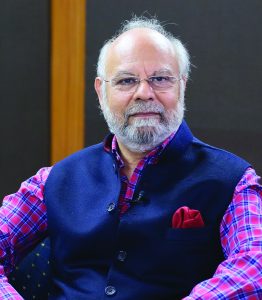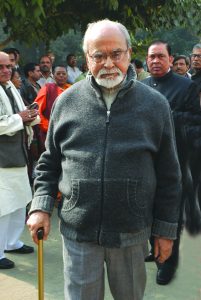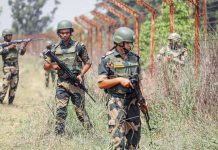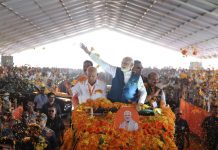 The nation, which forgets its heroes, will be itself forgotten”, said Calvin Coolidge, the 30th President of The United States. Former Prime Minister, Inder Kumar Gujral was a real hero who’s 100th Birth Anniversary fell on December 4, 2019.
The nation, which forgets its heroes, will be itself forgotten”, said Calvin Coolidge, the 30th President of The United States. Former Prime Minister, Inder Kumar Gujral was a real hero who’s 100th Birth Anniversary fell on December 4, 2019.
At the celebrations of the intellectual politician and a former Prime Minister whose appeal cut across party lines were held at the CD Deshmukh Auditorium at the India International Centre. One could see some of the most prominent faces of Indian politics Former President Pranab Mukherjee, former Prime Minister Manmohan Singh, former Vice-President Hamid Ansari, External Affairs Minister S Jaishankar, veteran parliamentarian Karan Singh, Nationalist Congress Party president Sharad Pawar, Communist Party of India (Marxist) leader Sitaram Yechury, Communist Party of India leader D Raja, Union Minister Harsh Vardhan, Congress leader Jyotiraditya Scindia, former civil aviation minister Praful Patel and former HRD minister Murli Manohar Joshi, among many others.
Govt forgets a hero
However, the government was perhaps not reminiscent of the illustrious ex-PM. There was no official celebration of the 100th birth anniversary of IK Gujral by the government. Not only the government forgot to celebrate the 100th birth anniversary befitting the lofty stature of Gujral, even the Parliament gave a miss even to the customary floral tributes. Indeed one can learn many lessons from the life of the former PM.
Why there was no prorgramme organized by the government or the Parliament befitting the contribution of Gujral raises a question? After all, I.K.Gujral had contributed a lot to the Nation and his son Naresh Gujral is a member of Parliament representing Shiromani Akali Dal, an ally of ruling Bharatiya Janata Party.
Of course, at the IIC celebrations to commemorate the 100th Birth Anniversary the top speakers lauded Gujral’s contribution. During his address the former President Pranab Mukherjee described Gujral as an intellectual giant and a scholarly Prime Minister. “He was the brain behind the Gujral doctrine that prescribed that India have greater engagement with SAARC nations except China and Pakistan. He was also instrumental in the improvement of India-Bangladesh relations through a water-sharing pact for the Ganges”.
Former Prime Minister, Dr Manmohan Singh said Gujral and he shared a strong bond. “Both of us came from villages in the same Jhelum district of Pakistan and he often reminded me of our common heritage.” External Affairs Minister S Jaishankar said he was grateful to Gujral for the life lessons he learnt during the time when Jaishankar was a diplomat posted in Moscow and Gujral was India’s ambassador to the USSR.
Dr Karan Singh said he appreciated the work ethic with which Gujral conducted himself. “Inder was one of the two Prime Ministers of India who were born in the erstwhile Pakistan and came to India as refugees and rose to become the foremost political leaders through the sheer dint of their hard work. On a personal note, he was always full of life. We spent many an evening discussing politics and Faiz Ahmed Faiz’s poetry.”
The evening concluded with a panel discussion on continuity and change in India’s foreign policy moderated by NDTV co-founder Prannoy Roy in which three of India’s best known former foreign secretaries — Kanwal Sibal, Shyam Saran and Shiv Shankar Menon — talked about the evolution of India’s foreign policy and the continued relevance of the Gujral doctrine in our neighbourhood.
Relevance of Gujral Doctrine
 South Asian region continues to be in turmoil. And there is rising tension between India and Pakistan in the aftermath of Pulwama suicide bombing killing 40 CRPF personnel by Pakistan terrorist group, Indian fighter jets targeting the Jaish-e-Mohammad terrorist camp in Balakot and subsequent abrogation of Article 370 revoking special status of Jammu and Kashmir. It is here that Gujral Doctrine is being debated in Lutyen’s Delhi as most relevant today and that, which can work to improve India’s ties with neighbours.
South Asian region continues to be in turmoil. And there is rising tension between India and Pakistan in the aftermath of Pulwama suicide bombing killing 40 CRPF personnel by Pakistan terrorist group, Indian fighter jets targeting the Jaish-e-Mohammad terrorist camp in Balakot and subsequent abrogation of Article 370 revoking special status of Jammu and Kashmir. It is here that Gujral Doctrine is being debated in Lutyen’s Delhi as most relevant today and that, which can work to improve India’s ties with neighbours.
The Gujral Doctrine is enshrined in a set of five cardinal principles to guide the conduct of India’s foreign relations with neighbouring countries. He explained in his autobiography-Matters of Discretion, “The logic behind the Gujral Doctrine was that since we had to face two hostile neighbours in the north and the west, we had to be at total peace with all other immediate neighbours in order to contain Pakistan’s and China’s influence in the region”.
He espoused the theory that India should not ask for reciprocity from smaller neighbours but give what ever it can in good faith. However, he emphasized that no country in South Asian region would allow its territory to be used by another country against the interests of another country from this region. Similarly, no country would interfere in the internal affairs of any other country in South Asian region and would respect each other’s sovereignty and settle disputes amicably.
The legacy
Gujral is rightly credited with a policy that was friendly towards its neighbouring countries to earn their goodwill and not to scare them by our huge size and dimensions. He was a gentleman, a man of principles, had a tough mind behind a soft exterior who has left a significant legacy in terms of the neighbourhood policy, pursued by prime ministers since then. The principles constituted a major break from conventional diplomatic thinking.
Gains from Gujral doctrine
To consider Gujral doctrine as weak would be to make former PM more sinned against than sinning. To bully small neighbours is not strength. The Gujral doctrine in essence is in national interest and manifests strength and reason. The Ganga Accord with Bangladesh over sharing seasonal flow below Farakka has eased tensions in the North-East through modest sharing. Similarly, the Mahakali Agreement with Nepal, which has helped resolve the dispute over Tanakpur project. That way India has sought friendship of neighbours-Bangladesh and Nepal rather than making them move to China. The Gujral doctrine aims at confidence building, changing mindsets and allowing concessions for long-term peace and bilateral gains.
At a glance
Gujral was the 12th Prime Minister of India and a very well-read person being a Ph.D. and D.Litt. He hailed from a family of freedom fighters. At a young age of 11, he himself had participated in freedom struggle in 1931 and was arrested. He was again jailed during the Quit India Movement. Before assuming the office of the Prime Minister, he was Minister of External Affairs, India’s Ambassador to USSR, Minister of Communications and Parliamentary Affairs, Information and Broadcasting, Works and Housing and leader of Rajya Sabha.
Gujral, who had been a writer and commentator on National Affairs, was a strong statesman who could call a spade a spade. Despite international pressure, Gujral had firmly refused to sign the Comprehensive Test Ban Treaty (CTBT) in October 1996. And even former Prime Minister, Dr. Manmohan Singh admitted that lives could have been saved had the then Home Minister Narasimha Rao heeded to Gujral’s advice to call Army into action. Singh had said, “perhaps the massacre that took place in 1984 could have been avoided”. Gujral’s main strength was friendship across parties and a decent demeanor. Shiromani Akali Dal, a Bharatiya Janata Party (BJP) ally had offered to get him elected to the Lok Sabha from Punjab.











